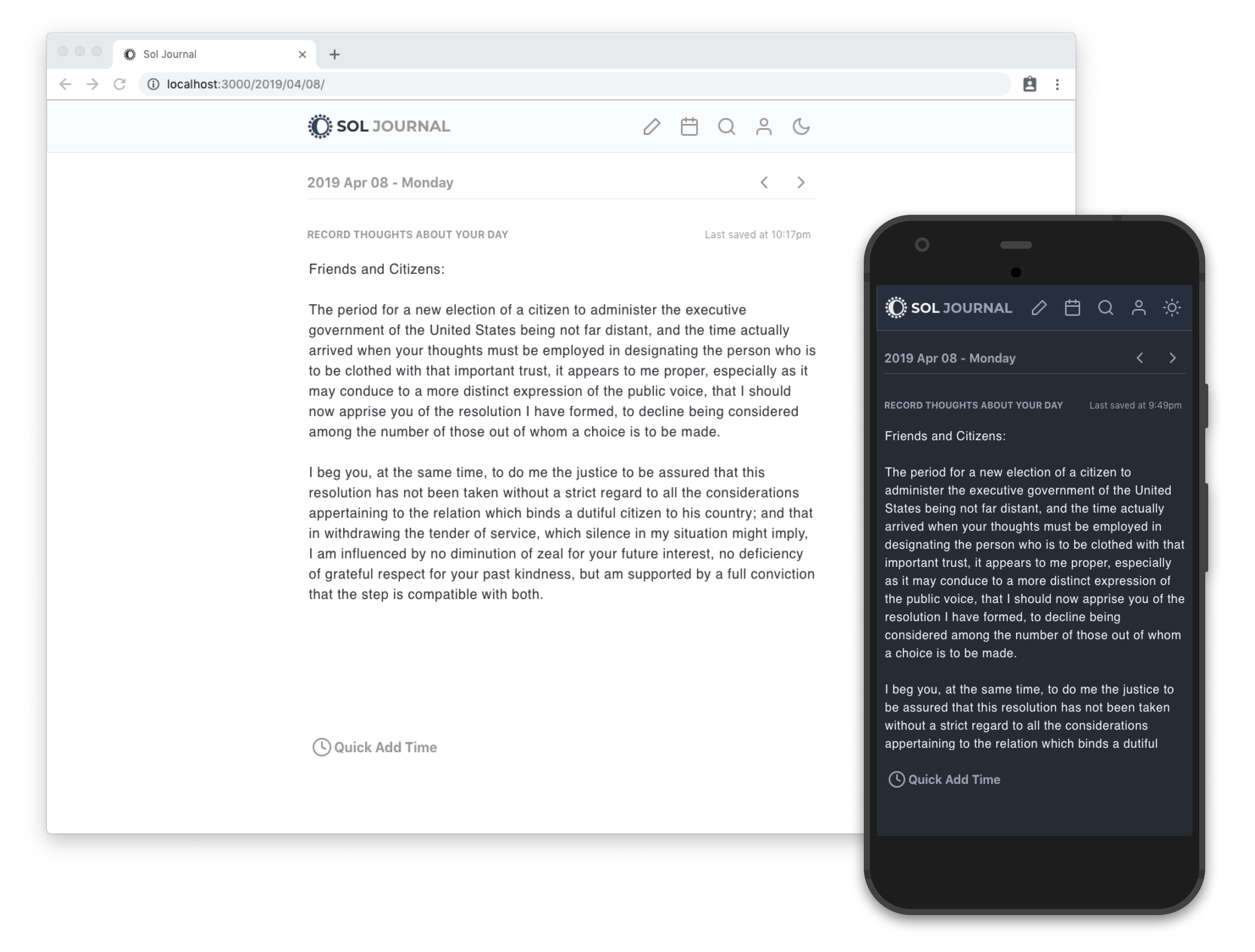Sol Journal is a simple, minimal, journaling platform that works offline and across all devices. It can be hosted yourself on Firebase and then installed as a PWA, on mobile devices for easy access on a phone, or on Desktops.
Journaling is a keystone habit that can improve your happiness and overall health. Writing in a journal with pen and paper is effective, but not as easily accessible, maintained, or preserved as taking advantage of digital platforms.
Having a journal that is available on any device makes journaling easier. Being tailored specifically to journaling makes it less cumbersome than trying to utilize a note taking app or document for recording thoughts and impressions.
There are 2 ways to get started using Sol Journal:
- You can develop it locally after hooking it up to your own Firebase project by following the instructions below
- You can host your own version and manage it yourself by following the setup docs
Sol Journal uses firebase to support offline functionality and authentication, meaning a new Firebase app will need to be setup with Firestore as a database if you wish to host it yourself. Be sure to add documents for users and entries, as well as enabling email for user authentication.
In the spirit of minimalism, a few key features are in place for a quick, lightweight journaling experience that can work across devices, including:
- 🔥 Authentication: Cloud firestore persists registered users to a users document and saved journal entries to an entries document
- 🎨 Theming: the
src/styles/theme.jsfile contains a set of colors and default styles that are applied to components with Emotion. A default light and dark theme are already in the file (adding theme-ui support would be a great future addition) - 🔍 Search: full-text search of a user's entries stored in Firestore for quick access to past entries
- 🖥 Mobile Friendly: designed to look great on mobile as well as desktop, with easy navigation on both
- 💡 PWA: being a progressive web app makes it installable from Chrome/Safari on desktop, or be added to the homescreen on iOS/Android
- 🔌 Offline Support: read/write when you're offline and let the updates happen when your connection is restored
- 🗄 Export: backup all of your entries at any time to save your data
Files are organized into these folders:
/components: user interface pieces to construct the design and layout of the site
/data: local data transformed by Gatsby to become queryable by Gatsby's GraphQL data layer
/img: images used by places like landing pages that are optimized by gatsby-image and then queryable in the GraphQL layer
/pages: public pages that can be seen by unauthenticated users and are completely server side rendered by Gatsby during gatsby build
/routes: private, client only routes only visible to authenticated users that are used by the app section of the journal
/styles: role based design tokens and theme definitions
/util: simple utility functions, for things like formatting dates
Clone the project:
git clone https://github.com/gillkyle/sol-journalInstall dependencies:
npm installor
yarnThen configure a file in a new .env file (using the .env.sample file as a reference) with the following keys from the firebase console:
GATSBY_FIREBASE_API_KEY=<BUNCHofRandomNumbersAndChars>
GATSBY_DEV_AUTH_DOMAIN=<name>.firebaseapp.com
GATSBY_DEV_DATABASE_URL=https://<name>.firebaseio.com
GATSBY_DEV_PROJECT_ID=<name>
GATSBY_DEV_STORAGE_BUCKET=<name>.appspot.com
GATSBY_DEV_MESSAGING_SENDER_ID=############
GATSBY_CONFIRMATION_EMAIL_REDIRECT=https://<name>.firebaseapp.comAgain, be sure to add documents for users and entries, as well as enabling email for user authentication.
Navigate into the project directory, and then launch the site with this command:
gatsby developThe site will be opened up in your default browser on http://localhost:8000
Edit code in the /src, save your changes, and they'll reload instantly in the browser.
To create an optimized build of the site run this command:
gatsby buildA /public folder will be assembled that can be deployed to any static file hosting service like Netlify or surge.
It can be deployed to firebase with this command:
firebase deploy -p publicSol Journal is inspired by JournalBook and borrows much of its design and navigation.
If you're interested in a comparable version of the project, you can check out this fork that adds rich text support to the journaling block.

